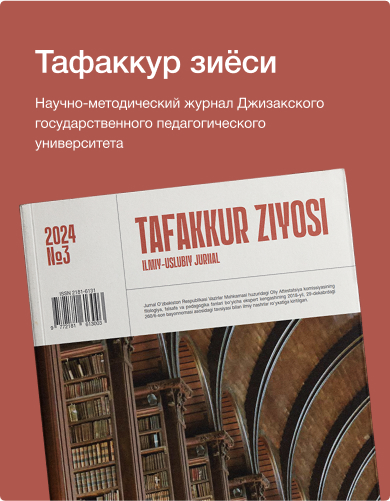Ahmedov Oybek Saporbayevich, Doctor of Philology
Professor of English Language Teaching Methods,
Uzbek State University of World Languages
Tilavova Malika Mamaraimovna, Teacher of English
Language Theory and Practice Department,
JDPU (Jizzakh State Pedagogical University) Jizzakh city, Sh. Rashidov Street.
Tel./fax. 2261357. 977939798
Abstract. The article analyzes the lexical-semantic features of phraseological units in a comparative aspect. Their formation, more precisely, their formation, was also observed in a transformational way, and the attitude of these units to negative emotions was studied. Also, a study of structural features of words belonging to idioms, one of the educational phraseological units, was carried out.
Key words: phraseology, phraseological units, transformational method, semantics, conceptual analysis, expressive, concept, bibliophile, voracious reader, avid reader, prolific reader, booklouse, reader, bookworm, cram, savant, scholar
INTRODUCTION
In our current linguistic spirituality and speech culture, especially speech etiquette the richness of our language, which is widely used among our people Phraseologisms with a unique appearance, that is, colloquial folk sayings, are is one of the spiritual units. They are important for the speech of the person, because such linguistic units have a strong place in the vocabulary of any language. Phraseological units It is a linguistic unit that disturbs speech as an effective tool. Every person in society they are used a lot, but some aspects of them are still scientific research, research without an object, including expressing their negative meaning. True, in phrases (in words both) there are many works related to the expression of both positive and negative meaning. However, the level of expression of negative emotions in English and Uzbek languages separately not studied.
Transformational analysis, which belongs to the “family” of structural linguistics methods, is especially important with its active use in the study of syntactic constructions – speech units. is important. Semantic and syntactic of phraseological units at the language and speech level it is appropriate to study the issue of construction based on the transformational method. We know that the components that make up the meaning structure of the word are various scientific researches determined in the process.
RESEARCH MATERIALS AND METHODOLOGY
These are based on the conclusion of the contextual analysis about the relation of meaning N. Shaykovich emphasizes that it is possible to draw conclusions about “The semantic connection of words is first of all known in the text. Only then is the statistic of words by studying its correlation, it is possible to draw conclusions about semantic relatedness”. [M.N. Shaykovich, 1998: 30].
There are two types of contextual analysis. On the one hand, it represents a syntactic relation, on the other hand, it shows semantic relatedness. However, contextually related words may not be semantically related, because meaning is always related requires syntactic analysis. If we determine the semantic connection of words, they have we can also observe syntactic relatedness. After all, it is not only groups of words that are being studied combines words semantically, but also words that are semantically far from each other. So, in this article, it is necessary to mention some considerations about relevance. First, to determine the nature and personality of the syntactic relationship between words possible In this process, we must observe one more condition. We want to say that the words are parallel it should have a syntactic structure and be parts belonging to one rod. Here he is now or there is a question about whether this phrase is defined. Any phrase if it is syntactic rules if it is based on and has a clear meaning, of course.
It is known that phraseology is a fragment of the linguistic landscape of the world. FB (phraseological units) the subjective attitude of the language subject to the object expresses, assesses the existence, reveals the emotional state of a person, the external of a person expresses various psychological reactions to the impact. Therefore, phraseology (another language tools-lexicon, etc. through) “human processing of information as a system, behavior learns to describe and explain, to express his inner experiences” [V.A. Maslova, 2007, 6 b].
RESEARCH RESULTS
Phraseology, as language units, with their meanings, includes folk wisdom and dreams, cultural traditions, myths and legends, religious beliefs and legends, historical events, as well as “pragmatic elements” – emotions, emotional reactions, subjective evaluations, methods of influencing the interlocutor, figurative, expressive of existence reflects the representation. This shows that FBs are a purely linguistic phenomenon [A.E. Mamatov, 2011, 188 b].
In later periods, conceptual linguistics influenced the strengthening of phraseological research spent. The notion of the concept comes from the fact that “the culture in the mind of a person cream, with the help of which culture enters the human mental world, they are in the word a part of expressed imagination, understanding, knowledge, associations. They are emotions, sympathy and antipathy are sometimes the subject of disagreements” [Yu.S. Stepanov, 2004, 49 b].
The question of the semantic importance of emotionality and expressiveness is one of the urgent issues its solution will undoubtedly help to study in depth the fundamental issues of solving the lexical meaning of the word and the meaning of FB. Studying these issues therefore, they are relevant because they are the essence of FB, the uniqueness of semantics, stable combinations mechanisms of organization, processes of creating phraseology, phraseological materials to develop and search for learning methods, phraseological analysis of fixed compounds, would have opened the way to their adequate interpretation in the text and dictionary. Expressive language the strengthening of expressiveness, imagery, increasing its influence, all language it is also observed in the following fields: phonetics, grammar, lexicon and word formation. new formation of words aims at nominative purposes, in most cases expressive expression is chosen for the purpose, because “expressiveness makes the speech even more understandable and effective will want” [A.V. Kunin, 1996: 380]. It is known that the main unit of organization of word formation is the word formation model.
With its morphological and semantic structure, it is expressive in many cases represents, that is, the words formed on the basis of this model are more expressive, they are “high has intensity” [I.V. Arnold, 2008, 62 b], because the person receiving the information attracts attention. not all models have expressive potential because “shut up”, “look at your mouth”, “don’t speak without knowing” the meaning of Facebook is very dominant is approaching the view. It should be noted that in a specific speech context, all models, or rather, words formed on the basis of one or another model, express expressiveness can be a tool [Yu.S. Stepanov, 2004, 3-4 b]. Imagery in language is a complex linguistic object. I.V. Arnold writes: “A bright image appears on the basis of finding similarities between objects that are far from each other. Objects should be sufficiently far from each other that their comparison is unexpected, it needs to draw attention to itself, the signs of differentiation should exaggerate the similarity” [V. Arnold, 2008, 74 p]. Identify words that are semantically close to each other is an important condition of FBs.
On the existing material to determine the semantic relationship of words in a sentence it will be necessary to perform specified operations. These operations are words serves as an objective basis for grouping. Also, the obtained material transformation – should be studied from the point of view of nominalization. For example, to feel in English We should consider the following points through the verbs to do. VI – to feel N1l. Of this as a result we have large groups of words, namely hate, loathe, detest, abhor, It is close in meaning to the verbs abominate. The words of this group are feelings expression can mean the meaning of the situation. Between these groups of words (words) are different there is a semantic relationship. Among this group, we can find subgroups with a very close relationship, which have common indicators of meaning.
Let’s consider one of the phraseological units, words related to idioms.
learn something by heart
To memorise something in such a way that you can say it from memory.
“I learnt the poem by heart.”
with flying colours
To succeed easily, with a very high mark or grade.
“I’m confident that Jenny will pass her English exam with flying colours.”
brush up on
To improve your knowledge of something already learned but partly forgotten.
“My English is getting weak. I had better brush up on it.”
cram
To try to learn a lot in a short period of time (mostly used in British English).
“Alex is cramming for tomorrow’s IELTS exam.”
bookworm
We use this idiom to describe someone who is always reading.
“Maria is always reading. She’s a real bookworm.”
DISCUSSION
Let’s look at the structural features of the educational idiom, bookworm.
bookworm
/ (ˈbʊkˌwɜːm) /
noun
a person excessively devoted to studying or reading
any of various small insects that feed on the binding paste of books, esp the book louse
For instance: She was a good deal of a bookworm, and did a great deal of beautiful embroidery, and never said much.
A bookworm is somebody who’s continuously perusing, more often than not since they fair adore to studied or since they’re examining or both. Bookworm is some of the time utilized contrarily to form fun of individuals who adore to examined. But it is more commonly utilized in a positive way, particularly by book significant others gladly calling themselves bookworms. Bookworm can too be utilized truly as a common title for any creepy crawly that eats books. Example: Bookworms usually have huge vocabularies, so use caution after you play one in Scrabble.
These words can be synonyms for bookworm. They are:
Bibliophile, voracious reader
avid reader, prolific reader
booklouse, reader,
savant, scholar
Book, worm are words that share a root or word element with bookworm.
Where does bookworm come from?
The to begin with records of the word bookworm come from the late 1500s. The word was to begin with utilized to allude to individuals who perused a parcel, regularly as an offended. For case, in a work by English writer and poet Ben Jonson, a book-worme (as he spelled it) is portrayed as a candle-waster, presumably suggesting that the individual peruses so much that they conclusion up perusing by candlelight and “wasting” candles fair to read. Only afterward was bookworm used in reference to creepy crawlies that eat books. For the record, not all worms are creepy crawlies, but a few are, counting the booklouse, which could be a wingless creepy crawly that frequently lives among books and papers and is known to nourish on the official glue utilized to hold a few books together. Interestingly, the eating metaphor is moreover utilized in other terms for individuals who examined a part. One such term is bibliophage, which actually implies “someone who eats up books” (it can moreover be utilized as a title for an creepy crawly that eats books, in spite of the fact that that’s uncommon)
Similarly, bookworms are now and then called voracious readers (voracious can be cruel either “eating a lot” or “very enthusiastic”). They are moreover called avid readers or bibliophiles (actually, “people who cherish books”). Bookworms usually cherish books, in spite of the fact that now and then individuals are essentially called bookworms because they examined a parcel to consider, as in She’s a bookworm—she continuously has her nose in a course reading. Such depictions can be negative, but bookworm is most regularly utilized emphatically, particularly as a self-applied name that bookworms use to recognize themselves to other bookworms. Yes, bookworms are some of the time classified as introverts , but they can be social, as well. (In spite of the fact that they may well be blameworthy of bringing a book to a party, fair as, you know, a reinforcement.)
CONCLUSION
It can be seen from the above that the importance of phraseological research is always discussed because it shows the interrelationship between language and society. In speech, phraseological units have connotations related to feelings and values.
Since learning a outside dialect requires both understudies and instructors to be imaginative, the last mentioned ought to be persuaded to apply different cutting edge methods of educating English diction (counting figures of speech, maxims and idioms). Whereas observing bona fide video materials, memorizing and playing back English adages and idioms, and organizing different vocabulary-based exercises it is valuable to require into consideration that in spite of the fact that tuning in and articulating are isolated aptitudes, the larger part of language aptitudes are not and ought to not be instructed independently. Talking exercises, dialog or pair-work are challenging and colossally propelling, and a center on diction makes the dialect normal and true. At long last, the above-mentioned exercises offer assistance to overcome a few phonetic challenges caused by considering colloquial expressions, adages and idioms, and deliver a idealize case of how culture imbues a dialect.
References
- Maslova V.A. Cognitivnaya linguistics: Uchebnoe posobie. – Mn.: TetraSistems, 2004.256 c.
- Nurmonov A., Iskandarova Sh. General linguistics.- Fergana, 2007.- 190 p.
- Anne Thwaite. Holliday’s View of Child Language Learning: Has it been Misinterpreted? // Australian Journal of Teacher Education, 44(5), 2019, P. 159-172.
- Mamatov A. Standardization of phraseological units. Tashkent.- 1993
- Tokhtasinova, N. R. Q., & Soibjonova, M. T. O. Q. (2022). TAGMA’NA AND PRAGMATIC STUDY OF PRESUPPOSITION PHENOMENON (Abdullah Qahhor in the example of his works). Central Asian Research Journal for Interdisciplinary Studies (CARJIS), 2(4), 141-146.
- Tukhtasinova, N. R. (2021). ISLEDOVANIE PREDVARITELNYX I TAGMANSKIH SOBYTIY NA RABOTAX ABDULLY KAXXAR. Economics i Socium, (2-2), 240-244.
- Tilavova, M. (2021). INVERSION IS A BRIDGE TO THE WONDERS OF THE LANGUAGE WORLD. Журнал иностранных языков и лингвистики, 2(3).
- Tilavova, M. (2020). Language is a bridge to the wonders of the world. Журнал дошкольного образования, (1).
- Tilavova, M. (2021). The Impact Of Motivation In Learning Foreign Languages. Журнал иностранных языков и лингвистики, 4(9).
- Mamaraimovna, T. M. (2022, January). THE ROLE OF MODERN UZBEK WOMEN IN THE PROSPERITY OF THE MOTHERLAND. In Conference Zone(pp. 226-230).
- Tilavova, M. M. (2022). THEORETICAL GRAMMAR OF ENGLISH AND THE MAIN DOMAINS OF LANGUAGE IN IT. Mental Enlightenment Scientific-Methodological Journal, 2022(1), 320-330.
- Tilavova, M. (2021). Variability Of Phraseological Units In English And Semantic Problems In Translation. Журнал иностранных языков и лингвистики, 4(9).
- Tilavova, M. (2021). The importance of learning a second language and its benefits for the individual. Журнал иностранных языков и лингвистики, 4(9).
- Tilavova,M. (2021). THE USE OF THE INVERSION IN THE LITERARY CONTEXT. Turkish Journal of Physiotherapy and Rehabilitation, (pp 35460-35471).
- Tilavova, M. (2021). РОЛЬ ИЗУЧЕНИЯ ИНОСТРАННЫХ ЯЗЫКОВ В ЖИЗНИ ЧЕЛОВЕКА. Журнал иностранных языков и лингвистики, 4(9).





